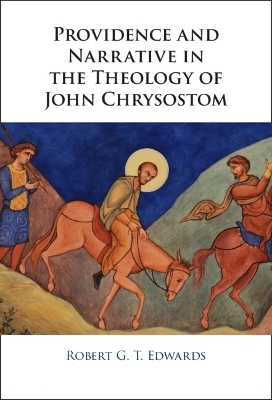
Providence and Narrative in the Theology of John Chrysostom
Seiten
2022
Cambridge University Press (Verlag)
978-1-009-22093-4 (ISBN)
Cambridge University Press (Verlag)
978-1-009-22093-4 (ISBN)
This is the first major study on providence in the thought of John Chrysostom(ca. 350–407 CE), a popular preacher in Antioch and then archbishop of Constantinople. Exploring the intersection of theology, exegesis, and pastoral care in Chrysostom's thought, it argues that he uses biblical narratives of providence as a means of consolation.
This book is the first major study of providence in the thought of John Chrysostom, a popular preacher in Syrian Antioch and later archbishop of Constantinople (ca. 350 to 407 CE). While Chrysostom is often considered a moralist and exegete, this study explores how his theology of providence profoundly affected his larger ethical and exegetical thought. Robert Edwards argues that Chrysostom considers biblical narratives as vehicles of a doctrine of providence in which God is above all loving towards humankind. Narratives of God's providence thus function as sources of consolation for Chrysostom's suffering audiences, and may even lead them now, amid suffering, to the resurrection life-the life of the angels. In the course of surveying Chrysostom's theology of providence and his use of scriptural narratives for consolation, Edwards also positions Chrysostom's theology and exegesis, which often defy categorization, within the preacher's immediate Antiochene and Nicene contexts.
This book is the first major study of providence in the thought of John Chrysostom, a popular preacher in Syrian Antioch and later archbishop of Constantinople (ca. 350 to 407 CE). While Chrysostom is often considered a moralist and exegete, this study explores how his theology of providence profoundly affected his larger ethical and exegetical thought. Robert Edwards argues that Chrysostom considers biblical narratives as vehicles of a doctrine of providence in which God is above all loving towards humankind. Narratives of God's providence thus function as sources of consolation for Chrysostom's suffering audiences, and may even lead them now, amid suffering, to the resurrection life-the life of the angels. In the course of surveying Chrysostom's theology of providence and his use of scriptural narratives for consolation, Edwards also positions Chrysostom's theology and exegesis, which often defy categorization, within the preacher's immediate Antiochene and Nicene contexts.
Robert G. T. Edwards is a Humboldt Postdoctoral Fellow at the University of Göttingen, Germany. He is a translator of John Chrysostom's works and has published widely on early Christian theology and exegesis in leading academic journals.
1. Stories of suffering and providence; 2. Divine and human activity in biblical narrative; 3. Narrative clusters, providential habits, and typological exegesis; 4. Proofs of providence and God's philanthropic character; 5. True judgments and consolation; 6. The virtue of yielding to providence.
| Erscheinungsdatum | 07.12.2022 |
|---|---|
| Zusatzinfo | Worked examples or Exercises |
| Verlagsort | Cambridge |
| Sprache | englisch |
| Maße | 159 x 235 mm |
| Gewicht | 500 g |
| Themenwelt | Geschichte ► Allgemeine Geschichte ► Vor- und Frühgeschichte |
| Geisteswissenschaften ► Philosophie ► Philosophie Altertum / Antike | |
| Geisteswissenschaften ► Religion / Theologie | |
| ISBN-10 | 1-009-22093-4 / 1009220934 |
| ISBN-13 | 978-1-009-22093-4 / 9781009220934 |
| Zustand | Neuware |
| Informationen gemäß Produktsicherheitsverordnung (GPSR) | |
| Haben Sie eine Frage zum Produkt? |
Mehr entdecken
aus dem Bereich
aus dem Bereich
Was Pompeji über uns erzählt
Buch | Hardcover (2023)
Propyläen (Verlag)
32,00 €
auf den Spuren der frühen Zivilisationen
Buch | Hardcover (2023)
C.H.Beck (Verlag)
20,00 €


